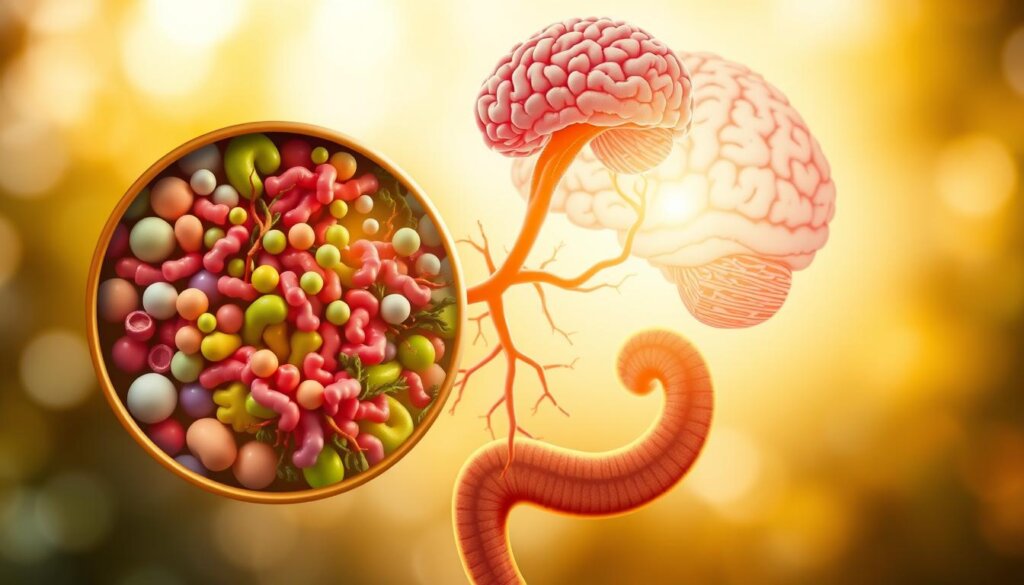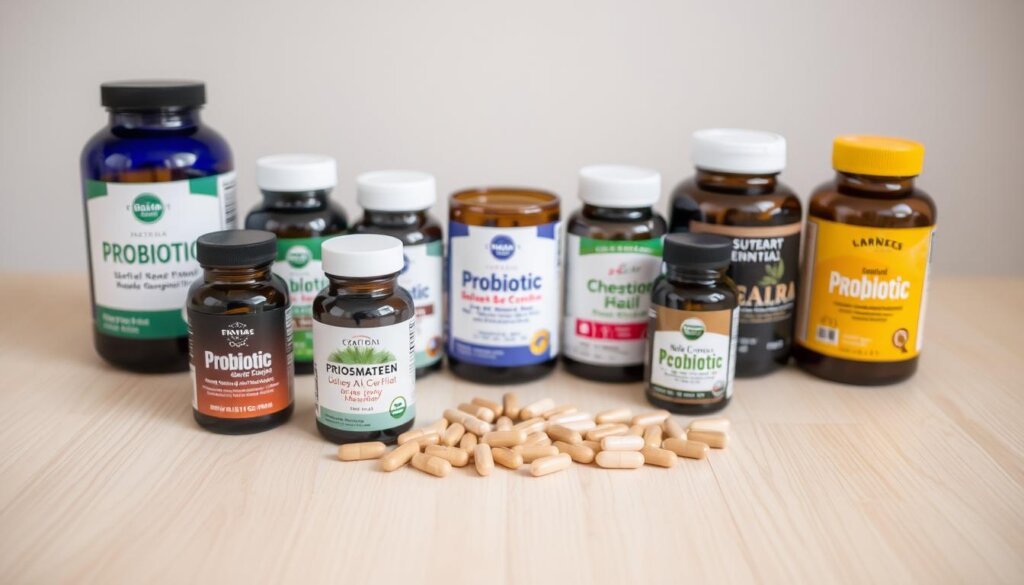What if the secret to managing modern stress isn’t found in meditation apps or supplements, but in your digestive system? Emerging research reveals a powerful link between gut health and emotional well-being—a connection that’s reshaping how we approach stress management.
Scientists now understand that the gut communicates directly with the brain through the gut-brain axis. This bidirectional pathway allows beneficial bacteria to influence mood, anxiety levels, and even cognitive performance. Specific strains of these microbes have shown remarkable potential in clinical trials for supporting mental resilience.
Urban lifestyles and processed diets often disrupt our natural microbial balance. This imbalance can amplify stress responses, creating a cycle that affects both physical and mental health. For Malaysians navigating fast-paced environments, restoring this balance becomes crucial.
Wellness Group Malaysia specializes in matching individuals with science-backed solutions tailored to their unique needs. Their experts help identify strains like Lactobacillus and Bifidobacterium, which studies suggest may improve mood regulation. Reach their team via WhatsApp at +60123822655 for personalized guidance.
Key Takeaways
- The gut-brain connection plays a vital role in emotional health
- Specific microbial strains show promise for mood support
- Modern diets often disrupt natural digestive balance
- Professional guidance enhances results
- Quality matters when selecting microbial supplements
Understanding Probiotics and Their Role in Stress Relief
The key to a calmer mind might lie in the trillions of microbes in your intestines. These microscopic allies do more than aid digestion—they actively shape how our bodies respond to life’s pressures.
Nature’s Tiny Helpers
Probiotics are live microorganisms that mirror the good bacteria naturally present in your digestive tract. According to Cleveland Clinic, these beneficial microbes strengthen gut lining integrity and crowd out harmful organisms. They produce enzymes that break down food while generating nutrients like vitamin K and B12.

When Gut Meets Mind
Your intestinal system contains over 100 million nerve cells—the enteric nervous system—that constantly communicate with the brain. “This biological chatroom uses neurotransmitters like serotonin, 95% of which originates in the gut,” explains a gastroenterology researcher. Chronic tension disrupts this dialogue, reducing microbial diversity and triggering inflammation that amplifies anxiety.
Specific strains produce short-chain fatty acids that calm immune responses and strengthen the blood-brain barrier. Regular consumption of fermented foods or quality supplements helps maintain this delicate ecosystem, creating natural defenses against daily stressors.
Best Probiotics for Stress Relief: A Buyer's Guide
Not all supplements are created equal when it comes to managing tension. Choosing the right formula requires understanding three critical elements: strain specificity, scientific backing, and quality assurance.

Key Factors to Consider When Choosing Probiotic Supplements
Look for products with 1 billion CFU or higher – studies show this threshold supports therapeutic effects. Storage matters too: some formulas need refrigeration, while others use shelf-stable technologies. Always check expiration dates, as live cultures lose potency over time.
Scientific Research and Strain Comparison
Leading strains like L. helveticus and B. longum demonstrate particular promise. A 2023 clinical trial found these strains reduced cortisol levels by 18% in participants facing chronic stress. Compare labels using this guide:
| Strain | Key Benefits | CFU Range | Research Status |
|---|---|---|---|
| Lactobacillus helveticus | Reduces anxiety markers | 3-5 billion | 12 clinical trials |
| Bifidobacterium longum | Improves sleep quality | 2-4 billion | 8 human studies |
| Bacillus subtilis | Enhances gut barrier | 1-2 billion | 5 animal studies |
Since dietary supplements aren’t FDA-approved, verify third-party certifications like NSF International. Those with gut health benefits often combine multiple strains for enhanced effects. Always consult a healthcare professional before starting new regimens, especially with existing conditions.
Navigating the Gut-Brain Axis and Mental Health Benefits
Could the key to mental clarity reside in your gut’s microbial community? Scientists now confirm that gut bacteria produce chemical messengers like serotonin and GABA—neurotransmitters that directly shape emotional responses. This biological conversation forms the foundation of mood regulation and cognitive performance.
How Microbes Shape Neural Pathways
Specific strains interact with the gut-brain axis through multiple channels. They strengthen intestinal barriers to prevent inflammatory compounds from reaching the brain. A 2022 review in Nutrients Journal highlighted how certain microbes reduce cortisol production during stressful events.
From Anxiety to Cognitive Enhancement
Groundbreaking studies reveal targeted benefits:
| Strain | Effect | Study Duration |
|---|---|---|
| L. plantarum PS128 | 34% anxiety reduction | 8 weeks |
| B. bifidum + L. fermentum | 17% memory improvement | 12 weeks |
| L. casei | Better sleep quality | 6 weeks |
IT professionals using PS128 reported fewer work-related worries and improved focus. Similarly, Alzheimer’s patients showed enhanced learning abilities after 3 months of bacterial supplementation. These findings suggest that microbiome diversity acts as a natural shield against modern stressors.
While results vary by strain, maintaining gut balance through quality supplements may help break the cycle of chronic tension. Always consult experts to match bacterial profiles with individual health goals.
Incorporating Probiotic-Rich Foods and Supplements in Your Diet
Transforming your meals into stress-fighting tools starts with understanding microbial allies in everyday foods. Simple dietary tweaks can create lasting changes in digestive wellness and emotional balance.
Fermented Foods That Enhance Gut Health
Malaysian kitchens offer delicious options packed with beneficial bacteria. Try these local favorites:
- Kimchi: Spicy fermented cabbage perfect with rice dishes
- Tempeh: Nutty soybean cake rich in protein
- Tapai: Traditional fermented rice or cassava
Non-pasteurized versions retain live cultures. Look for bubbles in kombucha or a tangy smell in yogurt—signs of active fermentation. Pair these with fiber-rich foods to feed good bacteria.
Supplement Dosage and Storage Tips
When using microbial supplements:
- Begin with 1-2 billion CFUs daily
- Increase gradually over 2-3 weeks
- Take with breakfast for better absorption
Store capsules in cool, dry places—some require refrigeration. Check expiration dates monthly, as potency decreases over time. Those managing digestive discomfort often benefit from combining supplements with dietary changes.
| Source | Pros | Cons |
|---|---|---|
| Whole Foods | Natural nutrients | Variable CFU counts |
| Supplements | Standardized doses | Require consistency |
For optimal results, many nutritionists recommend using both approaches. Track changes in digestion and mood to find your ideal balance.
Lifestyle, Diet, and Additional Strategies for Stress Management
Building resilience against daily pressures requires more than microbial support. A holistic approach combining nutrition and mindful habits creates lasting results for both body and mind.
The Role of B Vitamins and Nutrients
B vitamins act as co-pilots for energy production and nervous system function. Foods like eggs, leafy greens, and legumes provide these nutrients naturally. Pairing them with gut-friendly foods may help enhance nutrient absorption.
Vitamin D also plays a role in mood regulation. Sunlight exposure and fortified cereals offer simple solutions. Always consult a healthcare professional before starting new supplements.
Exercise, Hydration, and Mindfulness Practices
Physical activity boosts gut motility while reducing cortisol levels. Even 20-minute walks can make a difference. Stay hydrated—water aids digestion and helps transport nutrients.
Mindfulness techniques like deep breathing calm the gut-brain axis. Try these steps:
- Practice morning stretches
- Set hydration reminders
- Use guided meditation apps
These strategies work best when combined with a balanced diet rich in whole foods. Small, consistent changes often yield the most sustainable improvements in overall health.
FAQ
How do dietary supplements support mental wellness?
Certain strains, like Lactobacillus and Bifidobacterium, interact with the gut-brain axis. They produce neurotransmitters such as serotonin, which plays a role in regulating mood and emotional balance.
What should someone look for in a high-quality product?
Check for colony-forming units (CFUs), strain diversity, and third-party testing. Look for options with Lactobacillus plantarum or Bifidobacterium longum, which are studied for their calming effects.
Can improving gut microbiota reduce anxiety?
Research suggests a balanced microbiome may lower inflammation and cortisol levels. This supports healthier stress responses, though results vary. Pairing supplements with fermented foods like yogurt or kimchi can enhance outcomes.
Are there risks linked to using these products?
Mild bloating or digestive discomfort might occur initially. Always consult a healthcare professional, especially for those with immune issues or chronic conditions like irritable bowel syndrome.
How long does it take to notice changes?
Some people report improvements in sleep or focus within weeks. Consistency is key—combining them with hydration, exercise, and mindfulness practices often yields better results over time.
Do prebiotics play a role in this process?
Yes! Prebiotic fibers from garlic, onions, or bananas feed beneficial bacteria. This synergy helps maintain a thriving gut environment, amplifying the benefits of supplements.
Are there specific nutrients that enhance effectiveness?
B vitamins, magnesium, and omega-3s complement microbial health. For example, vitamin B6 aids serotonin production, while omega-3s reduce inflammation linked to stress.






